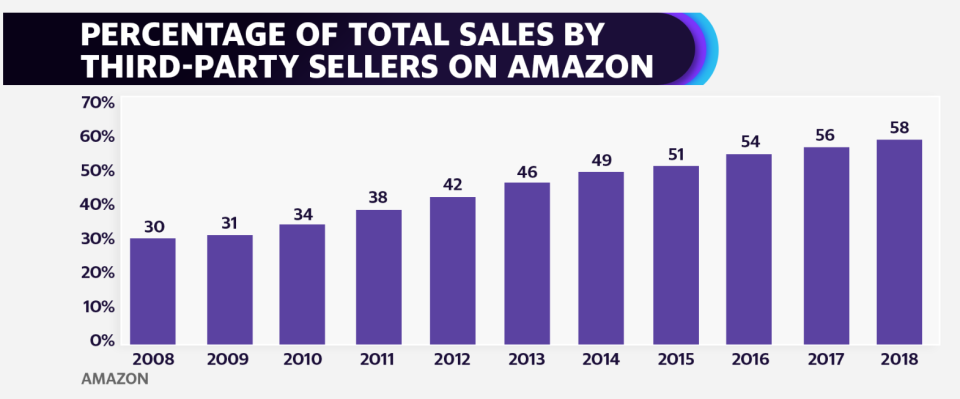This court ruling could change who’s responsible for your Amazon purchases
Amazon (AMZN) is known for its hybrid online retail model: being both a retailer and a marketplace for third-party sellers. Now, a ruling from a federal appeals court this week wants to hold the e-commerce giant accountable for third-party products sold on its platform.
The U.S. Court of Appeals for the Third Circuit in Philadelphia for the first time deemed Amazon as a product “seller” that can be held liable under state law for sales on its marketplace. The lawsuit was brought by an Amazon customer in Pennsylvania, Heather Oberdorf, who bought a dog collar with a retractable leash from a third-party seller on Amazon called the Furry Gang. When the leash broke, it hit Oberdorf and permanently blinded her in the left eye. The seller of the leash couldn’t be located by either Amazon or Oberdorf.
In a 2-1 ruling on Wednesday, Third Circuit judges deemed Amazon a “seller” of products on its website, even though the products are sourced and shipped by third-party vendors such as The Furry Gang. Thus, Amazon is liable for consumer injuries caused by defective goods purchased on its website.
This ruling came at a time when Amazon has put more emphasis on its marketplace business to investors as well as regulators. In the past 10 years, third-party sellers have gone from representing 31% of its total sales to 58%. Revenue from third-party market services grew 20% in most recent quarter. The narrative of empowering small businesses that sell on its platform also helps address antitrust issues raised by Washington.

The decision doesn’t apply to other online marketplaces, the Third Circuit judges ruled, which highlights Amazon’s unique offering to lure sellers. Amazon has differentiated itself by providing full services from shipping to payment and limit customers’ direct contact with the seller.
“Amazon’s involvement in transactions extends beyond a mere editorial function; it plays a large role in the actual sales process,” the court’s majority wrote. “This includes receiving customer shipping information, processing customer payments, relaying funds and information to third-party vendors, and collecting the fees it charges for providing these services.”
David Wilk, a lawyer at Lepley, Engelman, Yaw & Wilk who represented the Oberdorf couple, said Amazon has been “radio silent” since the ruling came out on Wednesday, July 3. But he expected Amazon to seek this decision overturned either by having the Third Court of Appeals reconsider it or potentially requesting the Supreme Court to review it, though the high court hears very few cases.
Wilk believes the fact that Amazon wasn’t able to locate the dog leash seller in this case played a role in the court’s decision. Amazon even sent a private detective to the seller’s registered address, but people who live there claimed no knowledge of the selling activities, according to Wilk.
Consumers are the testers
Amazon’s CEO Jeff Bezos sees building selling tools as one of the company’s top priorities. “There are many such tools, including tools that help sellers manage inventory, process payments, track shipments, create reports, and sell across borders – and we’re inventing more every year,” he wrote in the shareholder letter in April.
Thanks to the services, sellers on Amazon don’t need to hold any physical inventory or worry about shipping as long as they pay certain fees to Amazon. To customers, the line between goods sold by third-party sellers and Amazon-owned products are blurred sometimes, as they’re all shipped by Amazon and qualified for Amazon Prime.
The seamless shopping experience doesn’t always ensure quality products, as the dog leash case decided in Pennsylvania suggests. Still, Amazon has been able to avoid liability for products sold by a third party. Previously, two appeals courts found Amazon isn’t liable for third-party sales after the retail giant argued its “marketplace” nature merely facilities the transactions.
Still, Amazon has faced some consequences over third-party products. In April, an investigation by Washington Attorney General Bob Ferguson found children’s school supplies sold on Amazon’s marketplace had illegal levels of toxic metals lead and cadmium. Amazon paid a $700,000 fine and promised to launch nationwide corporate reforms, including requiring certifications and lab testing results to ensure product quality.
In some categories like electronics and baby products, Amazon already requires the importers, usually sellers that source products from overseas, to provide compliance documents, including test reports, a Children's Product Certificate as mandated by the U.S. Consumer Product Safety Commission, and supplier invoices.
“This is as good as it gets, without Amazon actually testing the products by themselves, which would be prohibitively expensive,” said Fredrik Gronkvist, co-founder at Chinaimportal.com, who helps Amazon sellers source products from China.
According to the Third Circuit opinion, though, Amazon generally doesn’t do anything to ensure its third-party vendors are in good standing with the country where they’re registered. Amazon also doesn’t have any procedures in place to ensure that third-party vendors could be held legally accountable in the U.S., the court said. Wilk, the plaintiff’s lawyer, argued Amazon should at lease require valid insurance liability insurance be carried by vendors or ensure a valid address for service of legal process.
This ruling is precedential in the Third Circuit, meaning that Amazon could face product liability lawsuits over third party products in the area where that court has jurisdiction (Delaware, New Jersey, and Pennsylvania).
Amazon did not respond to a request for comment.
The story has been updated with comments from the plaintiff’s lawyer.
Krystal Hu covers technology and China for Yahoo Finance. Follow her on Twitter.
Read more:
New bipartisan bills threaten Chinese IPOs and Chinese companies listed in the U.S.
Huawei is still winning 5G contracts around the world despite the U.S. ban
Read the latest financial and business news from Yahoo Finance
